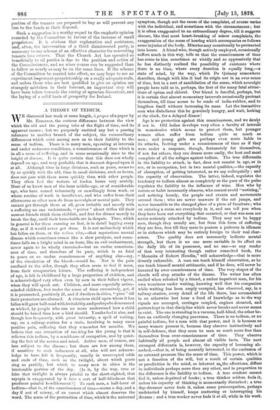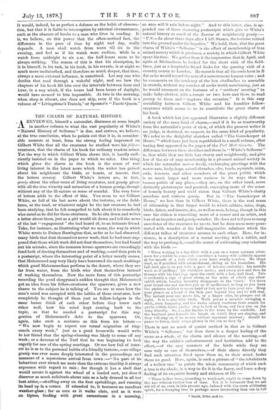A THEORY OF TEDIUM.
WE discussed last week at some length, a propos of a paper by Mr. Romanes, the curious difference between the view which the old and the young take of the flight of time, and its apparent causes ; but we purposely omitted any but a passing reference to another branch of the subject, the extraordinary differences which exist among men as to their liability to the sense of tedium. There is in many men, operating at intervals and under unknown conditions, a consciousness of time which is in all a cause of suffering, and in some occasionally rises to the height of disease. It is quite certain that this does not wholly depend on age, and very probable that it does not depend upon it at all. Although time in large divisions, such as years, seems to fly so quickly with the old, time in small divisions, such as hours, does not pass with them more quickly than with other people. They often feel the torture of leaden hours very acutely. Most of us know men of the later middle-age, or of considerable age, who have ceased voluntarily or unwillingly from work, or whose routine of work is insufficient, and who suffer from their afternoons as other men do from neuralgia or mental pain. They cannot get through them at all, grow irritable and moody with a suffering no one understands, " potter " about trifles till their nearest friends think them childish, and fret for dinner merely to break the day, until their households are in despair. Time, which in general is for them running so fast, is in detail lagging every day, as if it would never get done. It is not melancholy which has fallen on them, or the tedium vitx,—that mysterious mental disease which sometimes comes like a slow paralysis, and some- times falls on a bright mind in an hour, like an evil enchantment, never again to be wholly exorcised—but an undue conscious- ness of time, and therefore of its pace, which is as fatal to peace as an undue consciousness of anything else—say, of the circulation of the blood—would be. Nor is the pain confined to the elder, though they often seem to feel it most, from their comparative leisure. The suffering is independent of age, is felt in childhood by a large proportion of children, and is acknowledged very often even by men in their fullest vigour, when they will speak out. Children, and more especially active- minded children, fret under the sense of time excessively, get, if it is protracted, positively ill, and if dwellers in cities, " pine " till their protectors are alarmed. A vivacious child upon whom it has fallen will grow half-mad with irritability,and perhaps be denounced as wicked, by people who can no more understand how a child should be bored than how a bird should. Youths feel it also, and though less frequently, with great intensity, a spell of waiting, say, on a railway-station for a train, involving in many cases positive pain, suffering that they remember for months. We believe that one attraction of smoking for the young is that it relieves this tedium, by a semblance of occupation, and by quiet- ing the fret of the nerves and mind. Active men, of course, are less subject to the disease ; but there are few among them, if sensitive to such influences at all, who will not acknow- ledge to have felt it frequently, usually in unoccupied odds and ends of time, such as the twilight, about which poets sing so prettily, but which to many men in cities is the intolerable portion of the day. [Is it, by the way, true or false that twilight is always painful to the short-sighted, that myopia is exaggerated by it into a sort of half-blindness that produces painful bewilderment ?] To such men, a half-hour of tedium—that is, of the consciousness of time—seems a day, and a day if not of misery, of an unrest which almost deserves the word. The sense of the protraction of time, which is the universal
symptom, though not the cause of the complaint, of course varies with the individual, and sometimes with the circumstances ; but it is often exaggerated to an extraordinary degree, till it suggests disease, like that most heart-breaking of minor complaints, the exaggeration of the sense of hearing which accompanies or follows some injuries of the body. Minutes may occasionally be protracted into hours. A friend who, though actively employed, occasionally suffers much in this way, tells us that the consciousness of time has come to him sometimes so vividly and so oppressively that he has distinctly realised the possibility of existence where there is no time, where every duration is equally long,—.a state of mind, by the way, which De Quincey somewhere describes, though with him it had its origin not in an over-sense of time, but in a sort of annihilation of the sense, which neuralgic people have told us is, perhaps, the first of the many fatal attrac- tions of opium and chloral. Our friend is fanciful, perhaps, but it is certain that almost momentary intervals occasionally protract themselves, till time seems to be made of india-rubber, and to lengthen itself without increasing its mass. Let the insensitive man who disbelieves this be genuinely hungry, and wait, looking at the clock, for a delayed dinner!
Age is no protection against this consciousness, and we doubt if sex is. Old ladies develope very often a faculty of interest in monotonies which seems to protect them, but younger women often suffer from tedium quite as much as men ; and young girls are perhaps even more liable to its attacks, fretting under a consciousness of time as: if they were under a suspense, though, fortunately for themselves, if not for others, they can dream more easily, the best and most complete of all the refuges against tedium. The true differentia in the liability to attack, in fact, does not consist in age, or in sex, or in occupation, but in two mental qualities,—the capacity of absorption, of getting interested, as we say colloquially ; the capacity of observation. The latter, indeed, regulates the tendency to tedium almost as completely as the pace of the pulse regulates the liability to the influence of wine. Men who by nature or habit incessantly observe, who cannot avoid "noticing," and noticing keenly, the people and events and movements around them ; who are never unaware if the cat jumps, and never insensible to the changed place of a piece of furniture ; who on entering a room see everybody in it, and can tell you when they have been out everything that occurred, or that was seen are never seriously attacked by tedium. They may not be happy men, though they usually are, but from this form of suffering they are free, free till they seem to possess a patience in idleness or in sickness which may be entirely foreign to their real char- acters. The quality does not necessarily indicate mental strength, but there is no one more enviable in its effect on the daily life of its possessor, and no one—as any reader of that very interesting though rather conceited book, the " Memoirs of Robert Houdin," will acknowledge—that is more directly culturable. A man can teach himself observation, as he can teach himself mental arithmetic, and if he does, will never be haunted by over-consciousness of time. The very shapes of the clouds will stop attacks of the disease. The writer has often smiled when rebuked by a friend, a rather impatient man, for his own weariness under waiting, knowing well that his companion while waiting has been amply occupied, has observed, say, in a railway-station, every detail of the life there, has accumulated in an otherwise lost hour a fund of knowledge as to the way signals are managed, carriages coupled, engines shunted, and porters kept in that discipline which never breaks and never seems to exist. The one is standing in a vacuum, half-blind, the other be- fore an endlessly changing panorama. There is no tedium, or no painful tedium, for a man with that power, and it is because so many women possess it, because they observe instinctively and in self-defence, that they seem to men so much more free than themselves from over-consciousness of time. They observe habitually all people and almost all visible facts. The next strongest differentia is, however, the capacity of becoming ab- sorbed,—tbat is, of being mentally interested, to the exclusion of an external pressure like the sense of time. This power, which is not a function of the will, but a result of certain qualities or proclivities in the mind, as inherent as,the affections, differs in individuals perhaps more than any other, and in proportion to the difference is the liability to tedium. A true student cannot feel it, unless deprived of books ; a true thinker seldom feels it, unless his capacity of thinking is momentarily disturbed ; a true day-dreamer never feels it, unless some preoccupation, perhaps undetected by himself, keeps scattering or interrupting his dreams ; and a true worker never feels it at all, while in his work. It would, indeed, be as perfect a defence as the habit of observa- tion, but that it is liable to interruption by external circumstance, such as the absence of books to a man who lives in reading. It is, we believe, on this power that the often-noticed fact, the difference in the pace of time by night and day, really depends. A man shall watch from noon till six in the evening, and feel as if his watch were endless, while in a watch from midnight to six a.m. the half-hours seem to be always striking. The reason of this is that his absorption, be it in himself, in his task, in his book, in his reverie, is at night so much more undisturbed, and therefore so much deeper, that time, always a mere external influence, is unnoticed. Let any one who doubts that read through a wakeful night, and see how the chapters of his book lift him over the intervals between hour and hour, in a way which, if the hours had been hours of daylight, would have seemed to him impossible. At two in the morning, when sleep is absent, one does not skip, even if the book is a volume of Livingstone's Travels," or Spenser's " Faerie Queen."



































 Previous page
Previous page